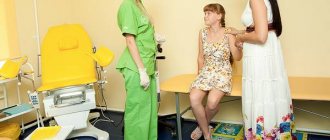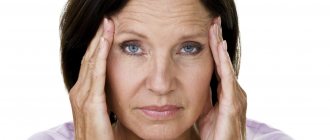Menopause does not bypass any representative of the fair sex. No one knows the exact age when menopause arrives; this figure varies from person to person and can range from 40 to 55 years. Signs of menopause in women aged 47 can manifest themselves in different ways, from severe hot flashes to minor ailments, but, despite their intensity, they cannot be ignored. Let's take a closer look at how to recognize the onset of menopause.
At what age does menopause begin in women?
Every woman's body is unique. The decline of childbearing function occurs in every woman at different ages. Nevertheless, the collected medical statistics make it possible to identify the average age corresponding to the onset of menopause. This is the age of 47 years .
In some cases, the first signs of menopause in women may appear before the age of 40. In this case, we can talk about the early onset of menopausal syndrome. This is a pathology that has been detected more and more often in recent decades.
The following groups of women may experience early menopause
- smokers;
- have had a large number of abortions;
- do not have a regular sexual partner;
- drinkers;
- those suffering from excess weight;
- dieters and starving people;
- having endocrine diseases;
- suffering from cancer.
Women experience menopause differently. Some feel only a slight discomfort, while others suffer greatly.
What are the phases of the onset of menopause?
Menopause goes through several phases, each of which has its own specific symptoms. The following phases are distinguished:
- Premenopausal phase;
- The phase of menopause itself;
- Postmenopausal phase.
Premenopause phase. This stage is the first when menopause appears. This period usually begins at the age of 47, and it marks the onset of menopause itself. If a woman detects the first signs of this phase, she should immediately consult a doctor and also focus special attention on her health, in particular on the condition of the genitourinary system. A year after the onset of the premenopausal phase, the period of menopause comes, and after that - postmenopause.
Factors influencing a woman's condition during menopause
Doctors identify 4 main factors that determine the well-being of patients during menopause.
- Natural aging. It is always accompanied by changes in the body at the level of receptors and hormones. Nerve cells die, which leads to a decrease in motor activity and the appearance of disorders of mental functions. Against this background, the development of depression is possible.
- The presence of somatic and nervous diseases. Every person has them. Another thing is that they obviously do not manifest themselves in everyone. Such diseases develop throughout life under the influence of a variety of factors. In women, they begin to manifest themselves acutely during menopause. By and large, they determine the signs of menopause in women at 47 years old. These are diseases such as: atherosclerosis, arterial hypertension, musculoskeletal disorders, anxiety, depression, etc.
- Hormonal changes. Their most striking manifestations are hot flashes and disorders of the genitourinary system. Against the background of hormonal changes, a restructuring of the central system occurs, affecting metabolic, endocrine, motivational and cognitive processes.
- Psychosocial state. We are talking about the living situation, financial condition, the presence of a man nearby, family harmony.
What to do if you notice signs of menopause at age 50 or earlier
The appearance of such signs at the age of 50 is not a tragedy, but a natural physiological process. To reduce their impact on your overall emotional and physical well-being, listen carefully to our advice. Don't deprive yourself of regular walks in the fresh air, don't sit in stuffy office spaces - this way you can normalize your blood pressure and avoid frequent hot flashes. Take a contrast shower regularly - it will help keep your body and skin toned, even if menopausal symptoms at the age of 48 are already making themselves felt.
Eat food that is extremely light and beneficial for the digestive tract - do not load your already weakened body with heavy and unhealthy food with many artificial additives. To alleviate the signs that have already appeared in women at 49 years old, take complex vitamins C and E and multivitamins - they will help strengthen the female body and replenish the reserves of missing microelements.
To keep your body and muscles in good shape, choose health-improving gymnastics, stretching classes, jogging, swimming, and hiking. This way you will prolong your youth and delay the onset of old age.
Basics of self-care during menopause
To somehow alleviate the symptoms of menopause at age 55, women should:
- avoid stress, engage in physical and mental work in moderation;
- completely eliminate alcohol, caffeine, and salt from the diet - they lead to insomnia, which is already common during menopause;
- regularly consume seafood and fish rich in polyunsaturated fatty acids;
- visit a doctor - in particularly difficult cases, the attending physicians prescribe hormone replacement therapy to alleviate the general health condition.
Menopausal symptoms at the age of 48 are another good reason to take more intensive care of your health, enjoy every minute of your life, and not suffer from the thought that it is no longer possible to conceive a child. With the right approach and systematic access to qualified doctors for consultation and examinations, you will not feel any noticeable changes in your body, except for the complete absence of menstruation. If necessary, you can get a free consultation, make an appointment with a mammologist, gynecologist and other specialists using the link https://45plus.rf/registration/.
Symptoms of menopause in women
After 45 years, with the onset of menopausal syndrome, every woman, to one degree or another, experiences the following symptoms:
- Psycho-emotional syndrome. It is best characterized by such terms as: menopausal depression and involutional hysteria. By the way, such disorders occur in women at any age, but are most often detected during menopause. Moreover, after 45 years they are more pronounced and in the vast majority of cases are accompanied by somatic diseases. Women in menopause get tired very quickly, stop paying attention to their appearance, worry about trifles, become suspicious, and overly vulnerable. They begin to fear old age and cry a lot.
- Sleep disturbance. This is one of the most striking symptoms of menopause. It occurs in 60% of all women. Patients complain of the inability to sleep, nightmares, and frequent awakenings at night. The causes of dyssomnia can be: vascular disorders in the brain and emotional disorders. Often during menopause, women begin to snore in their sleep. In addition, while sleeping, they may suddenly begin to kick their legs. Women experience headaches in the morning and want to sleep during the day.
- Psychovegetative disorders. We are talking about women’s complaints of difficulty breathing, pain in the left side of the chest, heart rhythm disturbances, and surges in blood pressure.
- Decreased performance. During menopause, a woman's thinking abilities deteriorate. It becomes more difficult for her to switch from one process to another. This causes some emotional problems.
- Endocrine disorders. This symptom most often manifests itself as an eating disorder. A woman begins to eat more or less. This leads to changes in body weight and swelling. This often leads to the development of joint pathologies and heart problems.
- Psychosocial symptom. The patient is unable to find a common language with others. Problems arise in the family and at work. This leads to a decrease in quality of life and isolation. It is for this reason that when menopause begins, a woman definitely needs the help of a psychologist.
- Sexual disorders. The vast majority of women lose interest in sex when menopause occurs. This is due to a significant decrease in the production of major sex hormones. Due to a 50% decrease in estrogen production, the vaginal walls become drier. Sexual intercourse in such conditions becomes painful. Due to testosterone deficiency, a woman is less interested in the opposite sex. Due to a lack of progesterone, a woman begins to have headaches, which discourage any interest in sexual intercourse.
Thematic pages > Advice from experts > Adulthood - new habits
Mature age - new habits
Menopause (menopause)
translated from Greek means “ladder”. This term refers to the transitional period in a woman’s life from the reproductive phase with regular ovulatory cycles and corresponding cyclic changes in the reproductive system to the state after the cessation of menstruation. T.V. Kaznacheeva, Candidate of Medical Sciences, Assistant of the Department of Reproductive Medicine and Surgery of the Faculty of Education and Science of Moscow State Medical University talks about the factors influencing the age of menopause, the symptoms that may accompany it, and gives advice on how to alleviate the course of menopause syndrome.
Factors influencing age at menopause
Periods
Menopausal disorders
Hot flashes
Menopause and lifestyle
During this period, age-related changes dominate in the reproductive system and are characterized by a gradual decrease and “switching off” of ovarian function. First, the reproductive function is disrupted, then the hormonal function, which is manifested by the cessation of menstruation. Reproductive aging is a long-term process that begins with a sharp decline in fertility (ability to conceive) after age 35, long before menopause occurs around age 50.
Factors
influencing the age of menopause
It is believed that the age of menopause is influenced by both hereditary (age of menopause of mother, grandmother, aunt) and acquired factors. For example, an earlier age of menopause is associated with smoking (active smoking of more than 10-20 cigarettes per day negatively affects the central nervous system, causes a lack of oxygen in the ovarian tissues, destroys follicles), stress, fasting, some chronic diseases, and thyroid dysfunction. , diabetes mellitus, etc. Some scientists express the opinion that the use of oral contraceptives (COCs) during a woman’s life delays the age of menopause.
The age at which menopause occurs largely depends on the number of follicles contained in the ovaries. By the time the first menstruation arrives, the number of eggs in the ovaries is approximately 300-400 thousand, and by the age of 50-51 years their number decreases to 1000, which corresponds to the age of natural menopause. Interestingly, the number of children born, as well as the socioeconomic status of the woman, do not have any effect on the age of menopause.
The average age of a woman at the onset of menopause is normally 51 years (about 50-55 years), its onset at the age of 40-44 years is considered early menopause, and at the age of 36-39 years - premature.
The menopausal period can occur differently for each woman - more severe or almost imperceptible.
In menopause, several periods are conventionally distinguished:
- premenopause - transition to menopause,
- menopause,
- perimenopause,
- postmenopause.
Premenopause
is a transitional period in a woman's life, it begins at approximately 45-47 years of age and lasts about 4 years. The very first symptoms of the onset of premenopause are often various disturbances of the menstrual cycle, and the nature of the disturbances can be different: changes in the regularity (more rare, with delays or more frequent) and the abundance of menstruation (scanty or more abundant, dysfunctional bleeding). Already during this period, symptoms such as “hot flashes” may appear. During this period, a woman's fertility (ability to conceive) sharply decreases. Only 5-10% of women do not clinically mark perimenopause as a transitional period, because they continue to have regular menstruation until menopause and there are no symptoms of estrogen deficiency. Premenopause smoothly transitions into menopause.
The term menopause appeared in 1821 and comes from two Greek words: men (month) and pausis (cessation), i.e. menopause is the last independent menstruation. If a woman has not had independent menstruation for a year, we can say that the last menstruation is menopause. If for some reason the ovaries were removed, then they talk about surgical menopause.
Perimenopause
- the period from the appearance of the first menopausal symptoms to 2 years after the last independent menstruation. During this period, periodic work of the ovaries to secrete female sex hormones is still possible.
Postmenopause
- the period from the beginning of menopause to 70 years. It is during this period that most menopausal symptoms gradually begin and develop.
Climacteric disorders
are conventionally divided according to the time of appearance into the following groups.
Early symptoms
occur even before the cessation of menstruation during the transition to menopause:
- hot flashes, chills, increased sweating, headaches, hypotension or hypertension, rapid heartbeat;
- irritability, drowsiness, weakness, anxiety, depression, forgetfulness, inattention, decreased libido.
Medium-term symptoms
occur 2-4 years after menopause:
- vaginal dryness, pain during sexual intercourse, itching and burning, pain in the bladder, urinary incontinence;
- dryness, brittle nails, wrinkles, dryness and hair loss.
Late symptoms
develop several years after the cessation of menstruation:
- cardiovascular diseases (atherosclerosis);
- postmenopausal osteoporosis;
- Alzheimer's disease.
Due to the increase in life expectancy (for Russian women, the average life expectancy is currently 72 years), the female body has been living with age-related changes for 25 years.
The restructuring of a woman’s body due to the cessation of the ovaries secreting female sex hormones affects almost all its organs and systems. By the age of menopause, there is an accumulation of all the unfavorable factors that affect a woman during her life: environmental factors, past illnesses and operations, lifestyle features. All this weakens a woman’s body, often giving rise to various diseases. Since age-related changes in the body as a whole are genetically programmed, they occur in all women, both during the physiological (mild, not manifesting itself) course, and during the pathological menopause. It is currently believed that how a woman endures this period (with or without a large number of hot flashes) has nothing to do with the disorders that arise in her body due to the decrease and cessation of the synthesis of sex hormones. Correction of age-related changes can be carried out for both therapeutic and preventive purposes.
According to the International Medical Consensus on Menopause, doctors should provide women with information to help them make decisions about hormone replacement therapy (HRT). In this regard, all women should be informed about the possible impact of short-term estrogen deficiency, namely the occurrence of early typical symptoms of menopausal syndrome and the consequences of long-term deficiency of sex hormones - osteoporosis, cardiovascular diseases, etc.; about the positive effect of HRT, which can alleviate and eliminate early menopausal symptoms, and also serves as a means of real prevention of osteoporosis and cardiovascular diseases; about contraindications and side effects of HRT.
Unfortunately, we often see the doctor’s reluctance to interfere with the “natural biological process.” As a rule, this is due to a lack of basic knowledge on menopause issues and HRT prescription regimens. This leads to the fact that women are not aware of modern opportunities to improve the quality of life during menopause, prevent the development of many diseases, and the help that doctors can provide during this difficult period of their lives.
Hot flashes
Hot flashes as a sign of menopause have been known since ancient Egypt. Interestingly, hot flashes are much more common among European women (about 50%) compared to Japanese women (only 20% complain of hot flashes). Perhaps this is due to the characteristics of traditional cuisine and products consumed by Japanese women.
During a hot flash, a woman experiences a feeling of heat, mainly in the upper half of her body, her face and neck turn red, and sweat appears. Women complain of stuffiness and try to cool themselves by opening all the windows.
During hot flashes, your heart rate often increases. In addition to hot flashes, women often complain of dizziness, tinnitus, imbalance, joint and headaches, sweating, poor heat tolerance, and increased blood pressure.
Hot flashes are provoked by drinking hot drinks, alcohol, or overheating. However, in most cases they appear for no apparent reason.
Hot flashes usually begin 2 years before the onset of menopause and last about a year on average, but can occur in a woman at 70 or even 80 years of age. About 25% of women complain of hot flashes within 5 years.
The duration, frequency and intensity of hot flashes vary. They can last from a few seconds to an hour, multiple times per hour or 1-2 times a month. The number of hot flashes per day is taken into account to assess the severity of menopausal syndrome - mild (up to 10 hot flashes per day), moderate (10-20 hot flashes per day) and severe (more than 20 hot flashes per day).
It should be borne in mind that at this age hormonal diseases (for example, the thyroid gland) often occur, the manifestations of which are similar to the symptoms of menopause - hot flashes, therefore such women are often recommended to have a blood test for hormones.
In fact, hot flashes reflect those damaging processes that occur in the vascular system and metabolism in response to a decrease in sex hormones.
However, you need to know that the absence of hot flashes is not a sign of a successful menopause, because The severity of the menopause is determined not by the presence of its symptoms, but by a decrease in the production of sex hormones.
Menopause and lifestyle
Lifestyle changes are an important and effective way to support a woman during this difficult period.
First of all, you need to give up bad habits - such as smoking.
It is important to monitor your weight and blood pressure. You can keep a diary where you should record blood pressure, weight and other important facts.
Do not neglect regular examinations of doctors: a therapist, gynecologist, mammologist - once a year, an ophthalmologist, psychotherapist and other specialists - according to indications (if necessary).
A balanced diet is of great importance.
Physical activity will make it easier to readjust, ease the course of menopausal syndrome, and allow you to control your weight.
Treatment of menopause
In order not to deceive readers, we will say right away that it is impossible to cure menopause . When it comes to treatment, it means eliminating the unpleasant symptoms caused by menopausal syndrome. Their elimination makes it possible to stabilize a woman’s condition during menopause.
For example, to eliminate unpleasant hot flashes, doctors recommend using Clonazepam. To prevent a woman from rolling her legs in her sleep, she is prescribed dehydroxyphenylalanine.
High blood pressure can be managed by taking ACE inhibitors . Poor sleep and nervousness are combated with sleeping pills and sedatives.
Symptomatic treatment with massage and special gymnastics gives good results.
Hormone therapy
Today, many doctors believe that in case of menopausal syndrome, the first step is to treat the patient through hormone replacement therapy. This approach allows you to avoid the development of complications such as diabetes, osteoporosis, heart disease, obesity, etc.
Naturally, such therapy should be carried out under the strict supervision of a doctor, because it has a number of contraindications:
- Uterine bleeding for no apparent reason.
- Breast oncology.
- Pre-infarction condition.
- Thrombophlebitis.
- Thyroid diseases.
- Preoperative preparation.
Drugs for replacement therapy contain small dosages of estrogen and progesterone.
Vitamin therapy
At a certain point in a woman’s life, there comes a time when the body begins to acutely lack the vitamins and minerals it receives from food. Such conditions most often appear during menopause. And we need to fight them.
To maintain carbohydrate and fat metabolism at the proper level, doctors prescribe vitamin and mineral complexes to patients.
Vitamins A, B, D, E are of greatest importance for a woman during menopause.
To compensate for the lack of vitamin D, Calciferol is prescribed. This drug helps prevent the development of osteoporosis.
Vitamin E is contained in the drug Tocopherol. Together with vitamin C, it reduces the severity of hot flashes and relieves irritability.
Treatment of menopause with folk remedies
Traditional treatment for menopause should be treated with caution. The fact is that with such therapy unexpected side effects . Therefore, before starting treatment, you should definitely consult a specialist.
Traditional recipes use herbal ingredients rich in estrogen. Most often these are soy products. Here it should be understood that it is not the estrogens themselves that have a positive effect, but the soy components.
Black leather has a good effect in combating hot flashes. This remedy should be taken with extreme caution as it may cause stomach upset.










